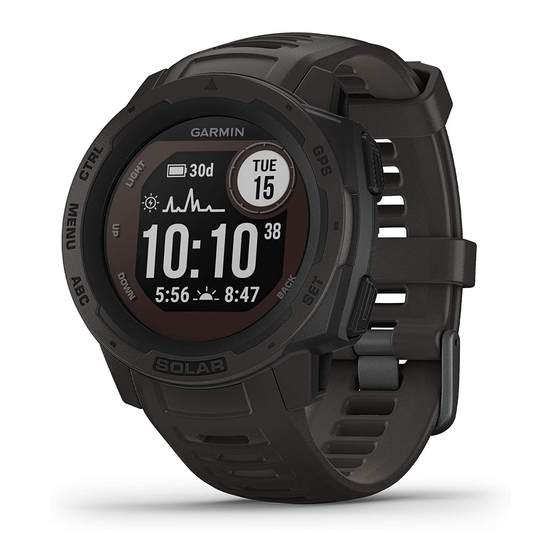Garmin INSTINCT SOLAR Benutzerhandbuch - Seite 11
Blättern Sie online oder laden Sie pdf Benutzerhandbuch für Siehe Garmin INSTINCT SOLAR herunter. Garmin INSTINCT SOLAR 38 Seiten.
Auch für Garmin INSTINCT SOLAR: Schnellstart-Handbuch (12 seiten)

Setting Your Heart Rate Zones
The device uses your user profile information from the initial
setup to determine your default heart rate zones. You can set
separate heart rate zones for sport profiles, such as running,
cycling, and swimming. For the most accurate calorie data
during your activity, set your maximum heart rate. You can also
set each heart rate zone and enter your resting heart rate
manually. You can manually adjust your zones on the device or
using your Garmin Connect account.
1
From the watch face, hold MENU.
2
Select Settings > User Profile > Heart Rate.
3
Select Max. HR, and enter your maximum heart rate.
4
Select Resting HR, and enter your resting heart rate.
You can use the average resting heart rate measured by your
device, or you can set a custom resting heart rate.
5
Select Zones > Based On.
6
Select an option:
• Select BPM to view and edit the zones in beats per
minute.
• Select %Max. HR to view and edit the zones as a
percentage of your maximum heart rate.
• Select %HRR to view and edit the zones as a percentage
of your heart rate reserve (maximum heart rate minus
resting heart rate).
7
Select a zone, and enter a value for each zone.
8
Select Sport Heart Rate, and select a sport profile to add
separate heart rate zones (optional).
Letting the Device Set Your Heart Rate Zones
The default settings use your profile information to set your
maximum heart rate and your heart rate zones as a percentage
of your maximum heart rate.
• Verify that your user profile settings are accurate
Your User Profile, page
• Run often with the wrist or chest heart rate monitor.
• Try a few heart rate training plans, available from your
Garmin Connect account.
• View your heart rate trends and time in zones using your
Garmin Connect account.
Heart Rate Zone Calculations
Zone % of
Perceived Exertion
Maximum
Heart Rate
1
50–60%
Relaxed, easy pace,
rhythmic breathing
2
60–70%
Comfortable pace,
slightly deeper
breathing, conversation
possible
3
70–80%
Moderate pace, more
difficult to hold
conversation
4
80–90%
Fast pace and a bit
uncomfortable, breathing
forceful
5
90–100%
Sprinting pace,
unsustainable for long
period of time, labored
breathing
Activity Tracking
The activity tracking feature records your daily step count,
distance traveled, intensity minutes, floors climbed, calories
Training
(Setting Up
6).
Benefits
Beginning-level
aerobic training,
reduces stress
Basic cardiovascular
training, good
recovery pace
Improved aerobic
capacity, optimal
cardiovascular training
Improved anaerobic
capacity and
threshold, improved
speed
Anaerobic and
muscular endurance,
increased power
burned, and sleep statistics for each recorded day. Your calories
burned includes your base metabolism plus activity calories.
The number of steps taken during the day appears on the steps
widget. The step count is updated periodically.
For more information about activity tracking and fitness metric
accuracy, go to garmin.com/ataccuracy.
Auto Goal
Your device creates a daily step goal automatically, based on
your previous activity levels. As you move during the day, the
device shows your progress toward your daily goal
If you choose not to use the auto goal feature, you can set a
personalized step goal on your Garmin Connect account.
Using the Move Alert
Sitting for prolonged periods of time can trigger undesirable
metabolic state changes. The move alert reminds you to keep
moving. After one hour of inactivity, Move! and the move bar
appear. Additional segments appear after every 15 minutes of
inactivity. The device also beeps or vibrates if audible tones are
turned on
(System Settings, page
Go for a short walk (at least a couple of minutes) to reset the
move alert.
Sleep Tracking
While you are sleeping, the device automatically detects your
sleep and monitors your movement during your normal sleep
hours. You can set your normal sleep hours in the user settings
on your Garmin Connect account. Sleep statistics include total
hours of sleep, sleep levels, and sleep movement. You can view
your sleep statistics on your Garmin Connect account.
NOTE: Naps are not added to your sleep statistics. You can use
do not disturb mode to turn off notifications and alerts, with the
exception of alarms
(Using Do Not Disturb Mode, page
Using Automated Sleep Tracking
1
Wear your device while sleeping.
2
Upload your sleep tracking data to the Garmin Connect site
(Manually Syncing Data with Garmin Connect, page
You can view your sleep statistics on your Garmin Connect
account.
Using Do Not Disturb Mode
You can use do not disturb mode to turn off the backlight, tone
alerts, and vibration alerts. For example, you can use this mode
while sleeping or watching a movie.
NOTE: You can set your normal sleep hours in the user settings
on your Garmin Connect account. You can enable the During
Sleep option in the system settings to automatically enter do not
disturb mode during your normal sleep hours
page
22).
NOTE: You can add options to the controls menu
the Controls Menu, page
20).
1
Hold CTRL.
2
Select
.
Intensity Minutes
To improve your health, organizations such as the World Health
Organization recommend at least 150 minutes per week of
.
22).
7).
14).
(System Settings,
(Customizing
7
